In Mozambique, we are implementing infection prevention and control measures and triage for respiratory symptoms in all health facilities where we work, including 16 new hand washing stations. We have adapted our models of care in order to decrease the need to visit our health facilities. frequently, allowing our patients and staff to comply with physical distancing measures. Our teams are also working with local authorities to improve patient flows by providing logistic and technical support for two referral hospitals in the capital, Maputo.
Our teams are integrating active COVID-19 surveillance in all project activities, with emphasis on high-risk populations. We’ve donated four tents to the main Maputo Central Hospital to assist with isolation care set-up.

